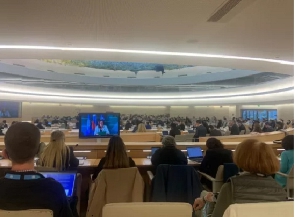 Some participants at the UNCHRC Global Conference
Some participants at the UNCHRC Global Conference
Chairperson of the Working Group of Experts on People of African Descent, H.E. Ms. Catherine S. Namakula, says racism, brutalities, killings and violence perpetuated by law enforcement agencies against people of African descent calls for continuous interactions and enhanced dialogue at the global community to end the cancer.
This, she explained, will ensure equal protection of the human rights of all citizens. Speaking at the 32nd meeting of the United Nations Human Rights Council 51st Regular Session in Switzerland, madam Namakula, noted contemporary civilization requires urgent and pragmatic steps to end all forms of racism, racial discrimination and police brutalities.
She noted such understanding must be situated within the 2001 World Conference in South Africa, popularly referred to as the Durban Declaration and Programme of Action, which addressed racism, racial discrimination, xenophobia and related violence.
The Executive Director of Mothers Against Police Brutalities, Ms. Flanagan, mentioned three primary challenges that confront policing and the protection of human rights the use of deadly force by the police, judicial dotting of qualified immunity and the treatment of families and communities suffering from racial profiling, police brutalities and extra-judicial killings.
She said the US Court offers the legal parameters for the rightful use of deadly force in law enforcement. Explaining that when an officer establishes a palpable cause to believe that the subject poses a significant threat of death to the officer or others, the specific use of force is evaluated by a reasonable officer.
Ms. Flanagan inferred that implies that the court has granted Police officers almost universal impunity even when they shoot an unarmed person at will.
“We cannot continue to justify the use of unwarranted force, based on officers’ perceptions and not the actual observable conditions at the scene”, Ms. Flanagan, added.